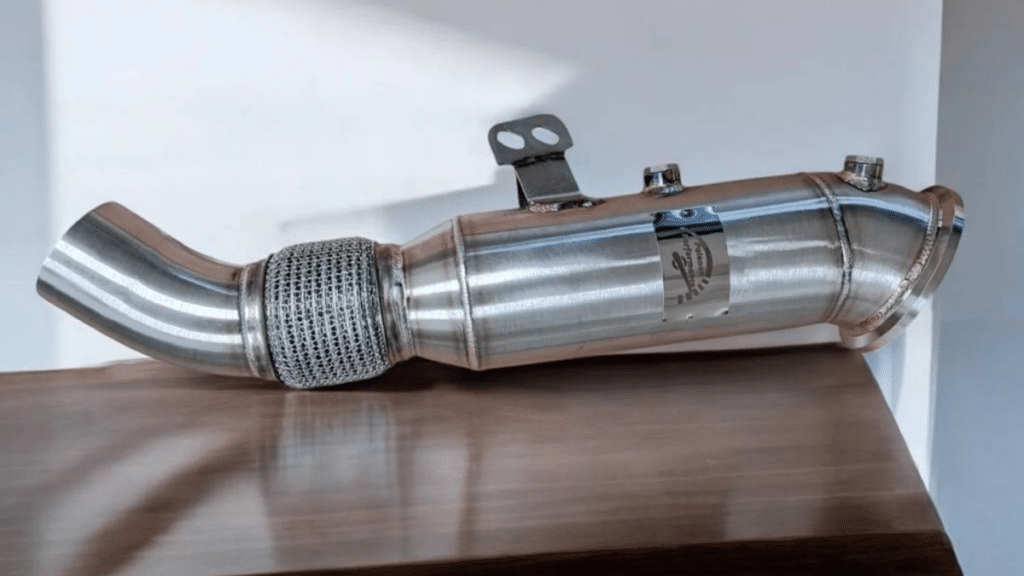Turbocharged engines are all about speed, power, and efficiency. Every component in the engine plays a crucial role in the overall performance of the engine. A turbo downpipe is the lead among them. A proper turbo downpipe can take the performance of your engine to a whole new level!
Just a turbo downpipe can boost your engine’s horsepower, torque, exhaust flow, and overall driving experience. But what exactly is a turbo downpipe, and how does it have such an impact? Let’s dig deep into the function of a turbo downpipe and why it is so important.
What is a Turbo Downpipe?
As the name suggests, this is an exclusive part upgrade of engines that have a turbocharger. For example, if you have a BMW car with a B58 engine, you can use BMW B58 downpipes as an upgrade. It connects the turbocharger to the rest of the exhaust system. The main purpose of this part is to direct hot exhaust gas out of the engine. Its primary function is to improve exhaust flow and reduce back pressure on the turbocharger.
With a reduced backpressure, the turbocharger can work more efficiently. A well-designed turbo downpipe can boost turbocharger spool efficiency, increase horsepower, and improve throttle response. They come in two main categories: catted and catless. The one with a catalytic converter is called catted, and the one without a catalytic converter is called catless. Both have different use cases with different pros and cons.
How Does a Turbo Downpipe Work?
The core functionality of a turbo downpipe is not very complex. Here is a brief overview of how a turbo downpipe works:
- It connects the turbocharger with the exhaust system and channels exhaust gases from the turbocharger to the exhaust pipes.
- It creates a smoother path for exhaust gases to reduce any resistance. This allows the engine to breathe more efficiently.
- A turbo downpipe expels the exhaust gas faster, allowing the turbocharger to spool quicker. As a result, the engine gets a massive boost in performance.
- With a bigger diameter and a less restrictive or no catalytic converter, a turbo downpipe enhances exhaust flow.
- A high-quality downpipe boosts the engine’s torque and horsepower by allowing it to breathe better.
Benefits of Using a Turbo Downpipe
The benefit list of using a turbo downpipe is rather long. It is hard to imagine how just one component can have such a big impact on a car’s performance. Here are some of the most impactful pros of using a turbo downpipe:
- Increased Horsepower and Torque
- Enhanced Turbo Efficiency
- Improved Exhaust Note
- Reduced Exhaust Temperatures
- Potential for Better Fuel Economy
- Options of Choosing Between Catted and Catless
Types of Turbo Downpipes
Based on the presence of catalytic converters, the turbo downpipes are divided into 2 categories:
Catted Downpipe
As the name suggests, this type of turbo downpipes comes with a built-in catalytic converter. They have 2 main advantages:
- Environment friendly and often aligns with emission restrictions
- The exhaust note is quieter than the other options
The only disadvantage of a catted downpipe is it slightly restricts the exhaust flow. As a result, you get less performance gains.
Catless Downpipe
This version of turbo downpipes comes without a catalytic converter. The major advantages are:
- Unrestricted exhaust flow for maximum power and turbo performance gain
- Louder, more aggressive, and sportier exhaust note
About disadvantages there are 2 notable disadvantages of using a catless downpipe.
- Illegal in many regions due to sound and emission issues
- Can trigger a CEL (Check Engine Light) if not tuned properly
Based on build materials, there are mainly 3 types of downpipes.
- Stainless Steel Downpipe
- Titanium Downpipe
- Mild Steel Downpipe
Is a Turbo Downpipe Right for Your Vehicle?
If your vehicle has a turbocharged engine, a turbo downpipe can be a great upgrade. But, you need to consider the following factors to determine whether it is right for your vehicle:
- Performance Goals
- Emissions Compliance
- Vehicle Compatibility
- Budget and Maintainance
- Driving Environment and Road
- Cost vs. Benefit
Considering all of these factors, if the turbo downpipe upgrade seems convincing, then you should really go for it. If it checks all the boxes, then there is nothing to lose from this upgrade.
Common Myths About Turbo Downpipes
Let’s have a look at some of the common myths about turbo downpipes and explore the facts.
- Turbo Downpipe Always Void Warranties
Fact: Sometimes, turbo downpipe voids the manufacturer’s warranty, but it’s not always the case. - Turbo Downpipe Damages Turbocharger
Fact: Quiet the opposite; it actually helps the turbocharger work more efficiently - Turbo Downpipe Only Benefits High-Performance Cars
Fact: Turbo downpipes will boost the performance of any engine that has a turbocharger
Conclusion
In a nutshell, a turbo downpipe upgrade can dramatically enhance the performance of an engine. You will gain a significant boost in horsepower, throttle response, torque, and exhaust sound notes. Considering this is a single-part upgrade, the gains are massive. Just make sure that the sound level and emissions comply with the regional laws.
